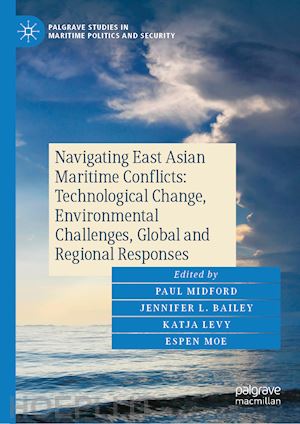

Questo prodotto usufruisce delle SPEDIZIONI GRATIS
selezionando l'opzione Corriere Veloce in fase di ordine.
Pagabile anche con Carta della cultura giovani e del merito, 18App Bonus Cultura e Carta del Docente
As technological development and diffusion have greatly increased the resources states can recover from maritime space, the stakes of these conflicts have grown. Nowhere is this clearer than in East Asia. This book examines how technological change and diffusion impact East Asian maritime conflicts, and approaches for conflict management and resolution.
Part I: Framework.- Chapter 1: Introduction.- Chapter 2: The Law of the Sea and its Relevance for Maritime Conflicts in East Asia.- Part II: Security Dimensions.- Chapter 3: Unmanned maritime platforms and the undersea struggle in the South China.- Chapter 4: Low Intensity Maritime Conflicts, Escalation Management and Technology.- Chapter 5: Military Automation, Robotics, and Maritime Security, Understanding New Dynamics in Conflict Escalation.- Part III: East Asian Maritime Competition and the Arctic.- Chapter 6: The Impact of Russia’s Ukraine Invasion on the Arctic-From Cooperation to Conflict?.- Chapter 7: China’s Arctic Strategy, From Follow-up to “Creative Involvement”.- Chapter 8: Japan’s Arctic Strategy, Countering East Asian Maritime Insecurity and Competition with China.- Part IV: Seabed Mining.- Chapter 9: Rare and Infinite The Minami-torishima “Semi-infinite” Rare Earth Elements and the historical dynamics of Deep-Sea Mining.- Chapter 10: Japan’s Seabed Mining as a Cause and Result of East Asian Maritime Tensions.- Chapter 11: Limited semi-infinity Japan's deepsea resources against the backdrop of China's rare earth.- Part V: Fishing and Renewable Energy.- Chapter 12: China's Digitalised Fishery Reform and Its Implications on the East Asian Maritime Order.- Chapter 13: Japan's New Whaling Policy, Marine Management in an Evolving Security and Technological Setting.- Chapter 14: Offshore Wind in Japan, Energy Production and Conflict Reduction?.- Part VI: Conclusions.- Chapter 15: Conclusions.
Paul Midford is Professor of Political Science, Meiji Gakuin University, Japan.
Jennifer L. Bailey is Professor of Political Science, Norwegian University of Science and Technology (NTNU), Norway.
Katja Levy is Associate Professor of Political Science, Norwegian University of Science and Technology (NTNU), Norway.
Espen Moe is Professor of Political Science, Norwegian University of Science and Technology (NTNU), Norway.











Il sito utilizza cookie ed altri strumenti di tracciamento che raccolgono informazioni dal dispositivo dell’utente. Oltre ai cookie tecnici ed analitici aggregati, strettamente necessari per il funzionamento di questo sito web, previo consenso dell’utente possono essere installati cookie di profilazione e marketing e cookie dei social media. Cliccando su “Accetto tutti i cookie” saranno attivate tutte le categorie di cookie. Per accettare solo deterninate categorie di cookie, cliccare invece su “Impostazioni cookie”. Chiudendo il banner o continuando a navigare saranno installati solo cookie tecnici. Per maggiori dettagli, consultare la Cookie Policy.